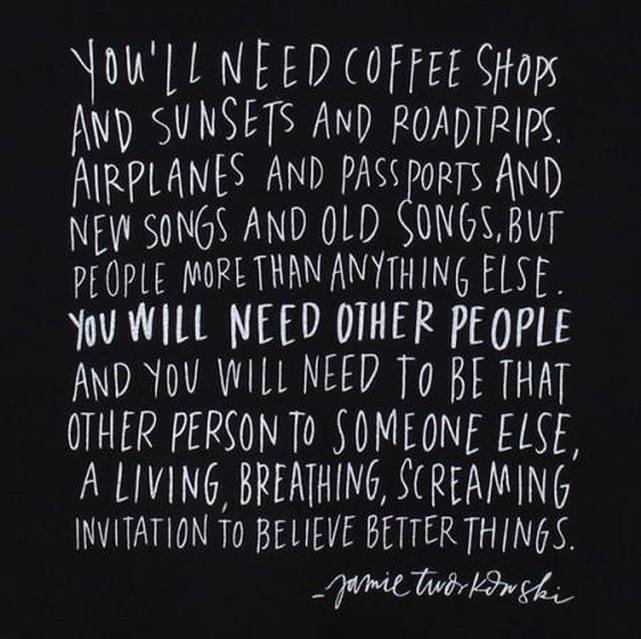If You Feel Too Much: Thoughts on Things Found and Lost and Hoped For Jamie Tworkowski (Tarcher) $16.95
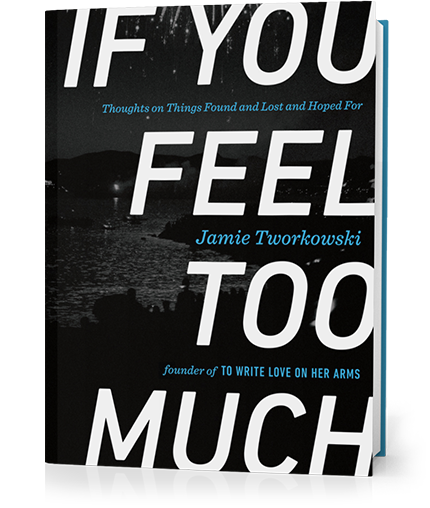 I don’t remember the first time I heard Jamie speak and chatted with him — I think it was at an underground hard music festival called Purple Door here in Central PA. I know he spoke at a number of pretty cool places, sometimes gave brief talks at indie rock shows, hung out with bands like Anberlin, supported Invisible Children around freeing child soldiers in Africa, ran with friends who promoted nationally-known gatherings like Catalyst and Q, and has been to Jubilee in Pittsburgh more than once (including this past year.) We have been impressed with his earnest, soft-spoken stories of caring for those who are hurting — fringe kids, mostly, those considering suicide, cutters, the addicted or depressed or those in chronic pain or those who feel marginalized for whatever reason — or those just feeling alone. As he became better known, he ended up telling his story even in the mainstream media, winning awards, getting on national TV. One of his best friends is Donald Miller (of Blue Like Jazz fame; he even figures in to the new Miller book, Scary Close.) The San Diego band Switchfoot has written songs inspired by him. He himself became somewhat of a rock star.
I don’t remember the first time I heard Jamie speak and chatted with him — I think it was at an underground hard music festival called Purple Door here in Central PA. I know he spoke at a number of pretty cool places, sometimes gave brief talks at indie rock shows, hung out with bands like Anberlin, supported Invisible Children around freeing child soldiers in Africa, ran with friends who promoted nationally-known gatherings like Catalyst and Q, and has been to Jubilee in Pittsburgh more than once (including this past year.) We have been impressed with his earnest, soft-spoken stories of caring for those who are hurting — fringe kids, mostly, those considering suicide, cutters, the addicted or depressed or those in chronic pain or those who feel marginalized for whatever reason — or those just feeling alone. As he became better known, he ended up telling his story even in the mainstream media, winning awards, getting on national TV. One of his best friends is Donald Miller (of Blue Like Jazz fame; he even figures in to the new Miller book, Scary Close.) The San Diego band Switchfoot has written songs inspired by him. He himself became somewhat of a rock star.
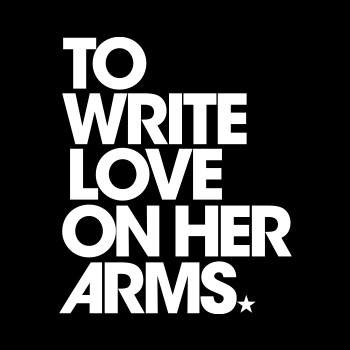
 You may not realize how popular he is or the extent of his remarkable ministry, To Write Love On Her Arms, but maybe this might be a clue: there is a Hollywood film made about him, called To Write To On Her Arms and you can rent it at Netflix or Redbox. Or buy it from us.
You may not realize how popular he is or the extent of his remarkable ministry, To Write Love On Her Arms, but maybe this might be a clue: there is a Hollywood film made about him, called To Write To On Her Arms and you can rent it at Netflix or Redbox. Or buy it from us.
Maybe you’ve heard the story that catapulted him into this flurry of reaching out, storytelling, activism, bearing witness. A young woman who would cut herself in horrific acts of self-loathing reached out to 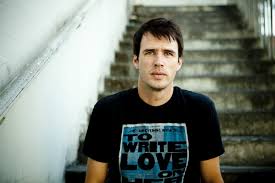 Jamie and his friends. They would be there for her, they promised — Renee was her name, and she struggled with addiction and depression and thoughts of suicide — and they wanted Renee to know, above all, that she is beloved of God, and has friends in this world who will walk through life with her. There was no literal writing “love” on her arms — that is apocryphal — but Renee moved in with this group of friends until they could get her into a treatment place. It was a moving time for all of them, and Jamie’s writing about it is poetic, passionate, raw. If you’ve ever entered into the very deep pain of others like this, you know it is holy ground. They affirm her, take her to some concerts, stay with her, buying cigarettes and bathroom stuff, helping her hold on. He writes,
Jamie and his friends. They would be there for her, they promised — Renee was her name, and she struggled with addiction and depression and thoughts of suicide — and they wanted Renee to know, above all, that she is beloved of God, and has friends in this world who will walk through life with her. There was no literal writing “love” on her arms — that is apocryphal — but Renee moved in with this group of friends until they could get her into a treatment place. It was a moving time for all of them, and Jamie’s writing about it is poetic, passionate, raw. If you’ve ever entered into the very deep pain of others like this, you know it is holy ground. They affirm her, take her to some concerts, stay with her, buying cigarettes and bathroom stuff, helping her hold on. He writes,
She hands me her last razor blade, tells me it is the one she used to
cut her arm and her last lines of cocaine five nights before. She’s had
it with her ever since, shares that tonight will be the hardest night
and she shouldn’t have it. I hold it carefully, thank her and know
instantly that this moment, this gift, will stay with me. It hits me to
wonder if this great feeling is what Christ knows when we surrender our
broken hearts, when we trade death for life.
It may date the story a bit to know that Jamie posted something about it on MySpace. And it did what we now call “going viral.”
The TWLOHA phrase took hold and in an odd blend of branding and hip marketing — gotta love kids these days with their technology and organizational savvy — and utterly sincere care for others, the movement took off. As anyone who has heard him (and, more importantly, anyone who knows him well) can tell, Tworkowski is a man who loves others, who serves others, who comes through in his promises. His faith motivates him to be with those who are hurting, the mentally ill, the bullied, the losers. His movement — blogs, speaking engagements, a cool media presence, and his staff showing up at rock festivals and concerts and other curious venues — has done much good in this world, person by person, reminding us all to love a bit more, to be aware of those who are hurting, to create safe places of inclusion and care and raw honesty. He cares about mental health issues, about depression and suicide, but he writes for all of us, any of us, who want to think about identity and purpose and grace and life.
Even those who are skeptical of these hip neo-evangelicals and their idealistic nonprofits and start-ups and cool-sounding social initiatives have to admit: this is the real deal, offered without cynicism or irony or self-interest. The teams involved with To Write Love On Her Arms are living out Christ-centered, grace-driven faith over the long haul, despite knowing what they know about the world and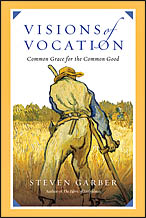 the horrible ways people suffer. Perhaps without realizing it, they’ve embodied some of the principles of Steve Garber’s Visions of Vocation: Common Grace for the Common Good, the rumination on how to mourn with the world, knowing how broken things are, and yet be responsible to do something about what we know and feel and care about. They want to (as Garber reflects upon) feel what God feels and respond in God’s own ways, embodied, real, Christ-like, true. That this new Tworkowski book is called If You Feel Too Much is fascinating, isn’t it? That it promises in the subtitle writings about what is “hoped for” is vital. I can’t wait to continue through it myself.
the horrible ways people suffer. Perhaps without realizing it, they’ve embodied some of the principles of Steve Garber’s Visions of Vocation: Common Grace for the Common Good, the rumination on how to mourn with the world, knowing how broken things are, and yet be responsible to do something about what we know and feel and care about. They want to (as Garber reflects upon) feel what God feels and respond in God’s own ways, embodied, real, Christ-like, true. That this new Tworkowski book is called If You Feel Too Much is fascinating, isn’t it? That it promises in the subtitle writings about what is “hoped for” is vital. I can’t wait to continue through it myself.
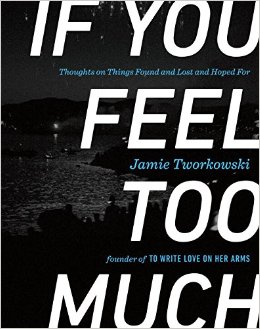 If You Feel Too Much: Thoughts on Things Found and Lost and Hoped For is brand new and I haven’t read it straight through. I can say that the book is loosely built around previous blogs, earlier writings, edited and cut and pasted into a narrative that unfolds, pieces that can be read as stand alone chapters, but now cohere, nicely related. I think it is a book that is very nicely done, useful, too, as a wonderful example not only of what one person can do, but, more, a glimpse into the heart of a person who has such obvious gifts of being present to others. If you read even a bit of Jamie Tworkowski you will discover a man who is self-aware, caring, able to step into the pain that other people feel and absorb some of it, even, offering hope and healing and goodness and beauty. Taken together, these short essays weave together a picture of a good man, doing very good work (even amidst his own issues and losses and life story.) If You Feel Too Much is for the sad and hurting and hungry and searching, to be sure, but it is for all of us, modeling gently what it means to be fully alive, open to questions, on a mission for God, filled with the spirit of Christ Himself. It is a good book and it is for all of us.
If You Feel Too Much: Thoughts on Things Found and Lost and Hoped For is brand new and I haven’t read it straight through. I can say that the book is loosely built around previous blogs, earlier writings, edited and cut and pasted into a narrative that unfolds, pieces that can be read as stand alone chapters, but now cohere, nicely related. I think it is a book that is very nicely done, useful, too, as a wonderful example not only of what one person can do, but, more, a glimpse into the heart of a person who has such obvious gifts of being present to others. If you read even a bit of Jamie Tworkowski you will discover a man who is self-aware, caring, able to step into the pain that other people feel and absorb some of it, even, offering hope and healing and goodness and beauty. Taken together, these short essays weave together a picture of a good man, doing very good work (even amidst his own issues and losses and life story.) If You Feel Too Much is for the sad and hurting and hungry and searching, to be sure, but it is for all of us, modeling gently what it means to be fully alive, open to questions, on a mission for God, filled with the spirit of Christ Himself. It is a good book and it is for all of us.
The brief introduction is by Jon Foreman of Switchfoot. It is a beautifully-written, short tribute. It struck me as a beautiful way to start the book, with a simple story and a great line or two that you’ll want to remember.
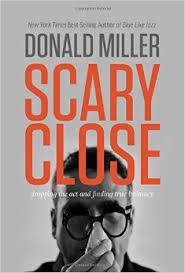 The longer foreword is by memoirist Donald Miller, and it is marvelous. (He retells the moving story from a chapter in his Scary Close of leaving a note in Tworkowski’s shoe once when they were together.)
The longer foreword is by memoirist Donald Miller, and it is marvelous. (He retells the moving story from a chapter in his Scary Close of leaving a note in Tworkowski’s shoe once when they were together.)
Noting that Tworkowski’s fame hasn’t changed him — “He just keeps saying the same thing, softly, as though from some other planet: We need one another. There’s no reason to judge. People are more fragile than you could possible imagine” — Miller talks about their friendship, and how Jamie treats him.
I now consider Jamie one of my closest friends. He’s the one to call me when I say something unkind online. He reminds me people are hurting and we are supposed to be bigger than the Darwinian games that tempt us. And not only does he call me on my crap, but I call him when I’m hurting.
Miller observes,
Jamie is a mystery to me, I remember thinking. He doesn’t so much tell a story as he is a story. He pours his heart into blogs and shares them with the world… Can things as immeasurable as love, acceptance, grace, tolerance, and forgiveness create a better world? These aren’t commodities measured in financial exchanges, after all…
You know, we review books here sometimes that are deep, maybe for those with specialized interests, including some serious theology and cultural studies that some may find a bit arcane. We promote some that are, in fact, somewhat demanding. (Only we called the release of a six-volume set published by Dordt College Press by the Christian philosopher of aesthetics Calvin Seerveld “the publishing event of the year.”)
But sometimes we relish just clear, good writing about personal, raw stuff. It is why we like Bob Goff (of the great book Love Does) so much; even though he is a lawyer and human rights activist, traveling often to and writing from his beloved Uganda, his books and talks mostly just inspire people to love others. Clear, simple, basic, and the kind of thing we can all move towards: loving others more consistently, with more abandon, like Jesus says. This is what Tworkowski does, offering real hope by saying that we humans have the capacity to care for each other. We are wired by God for real relationships and we can let go of judgement and fear, to open ourselves to know and be known. Yada, yada, you know, means to know and be known.
Listen to some of the other endorsements offering blurbs for this long-awaited book, including a great one by Bob Goff:
Jamie loves people unlike anyone I’ve ever met. He is also a humble guy and a faithful friend. He’s the one who has offered to come on my darkest day, to cry with me, and on my best day to celebrate. His brand of love is one without judgement, boundaries, or pretense. This book gives you a wonderful glimpse at Jamie’s beautiful heart. You’re in for a treat. Bob Goff (author of Love Does.)
Through poignant self-reflection and stories that pulse with a poetic rawness, Jamie invites us to be part of a bigger conversation. It’s one that leads to community, connection, healing and incredible hope.” Dr. Georgiana Smith, clinical psychologist
Here is what the founder and producer of the Van Warped Tour says:
When I first met Jamie, he struck me as someone on a mission. Through his sheer determination, he brought some difficult issues out of the shadows and helped so many people realize they were not alone. I believe this book will inspire others to do the same, to get help, and to chase their passion just as he has.
Although he is a man on a mission, apparently in constant motion, serving others, thinking of new ways to share grace and goodness, writing and speaking, a year ago he took several months off embracing a rare sabbatical, in order to prayerfully discern some next steps, and to write this book so many told him he should write. He says in the beginning that he has often wanted to write (“every time I walked into a bookstore, something in me ached to have a seat at the table”) but a new, long-form book just wasn’t happening. He says he felt like a sprinter doing a marathon. Someone suggested a ghost writer, which he never considered (God bless him!) JT is a person of his word, and sentences matter to him.
 He tells us,
He tells us,
And so for years the idea sat, an awkward dream on some back burner. Awkward because there was no update, no progress. It took a while to warm up to the possibility that I could simply be myself, that I could write the way I write, about the things I’m moved to write about. And then it took some more time to realize that perhaps my book was mostly written, that in the nine years since TWLOHA began, I had written thousands and thousands of words, words that I was proud of, words that had moved people. What would it look like to find the best of it, and to put it all in one place?
And so began a journey in reverse, to collect and to remember and to place things side by side. It turned out there were clues back at the beginning, in the days before the story that would change so many things. There were words starting to emerge a decade ago, when I was just a surfer selling t-shirts and board shorts.
I’m sure many fans, and many of us who write, will appreciate his saying this, too:
The truth is that part of me felt lost, feels lost. And it’s hard to tell a story you don’t like. So there was a subplot as I began that backwards journey, back through the last ten years. I’m trying to get back to someplace true, to someone I knew and liked a lot. I’m trying to make sense of my story, trying to make peace with it, perhaps so I can tell it, but more so I can smile. The ache is for a life that I believe in, and this book is brave in ways I hope to return to. I needed to g back, to read these words and retrace the steps, in order to move forward.
All of that brings us to you. I wonder where this finds you. I wonder what you’ve known and what you feel, what you’ve found and lost and hoped for. Perhaps there’s still time, time for things to turn around, time for us to be surprised. Perhaps there’s still a lot of beauty to be found here, and good people too. People to love and people who will say we’re not invisible.; Perhaps there’s everything we need.
So if you feel as if you feel too much, well then you are not alone.
May these words fine you like a friend.
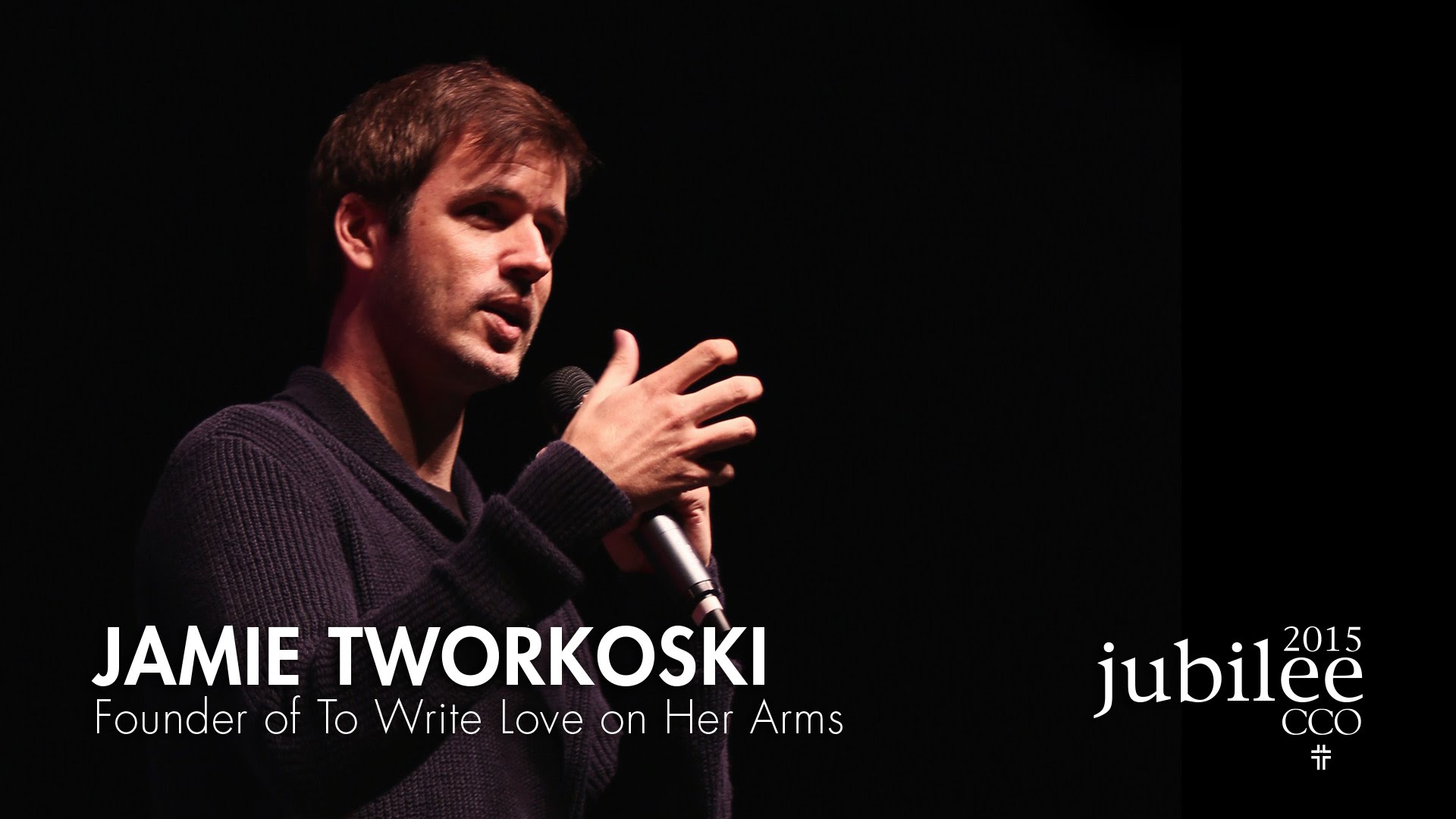 Here is a great 20 minute video clip where you can watch Jamie’s presentation at Jubilee 2015. It is really good and I invite you to watch it.
Here is a great 20 minute video clip where you can watch Jamie’s presentation at Jubilee 2015. It is really good and I invite you to watch it.
We have If You Feel Too Much: Thoughts on Things Found and Lost and Hoped For by Jamie Tworkowski on sale, at 20% off. (It regularly sells for $16.95 but for BookNotes fans and our online customers we have it at $13.56.) It is a casebound hardback, sans dust jacket, so looks pretty sharp.
We would be honored to sell it, happy to ship it to someone on your behalf, if that is what you want. As Tworkowski tells his story by way of this decade’s worth of essays, short pieces, articles and blog posts, you will be moved to celebrate his honest efforts, his own struggle, and his deep care for this wounded world. It may remind you of things you, too, have lost or found, things you still hope for. Enjoy.

BookNotes
DISCOUNT
ANY ITEM MENTIONED
20% off
order here
takes you to the secure Hearts & Minds order form page
just tell us what you want
inquire here
if you have questions or need more information
just ask us what you want to know
Hearts & Minds 234 East Main Street Dallastown, PA 17313 717-246-3333

